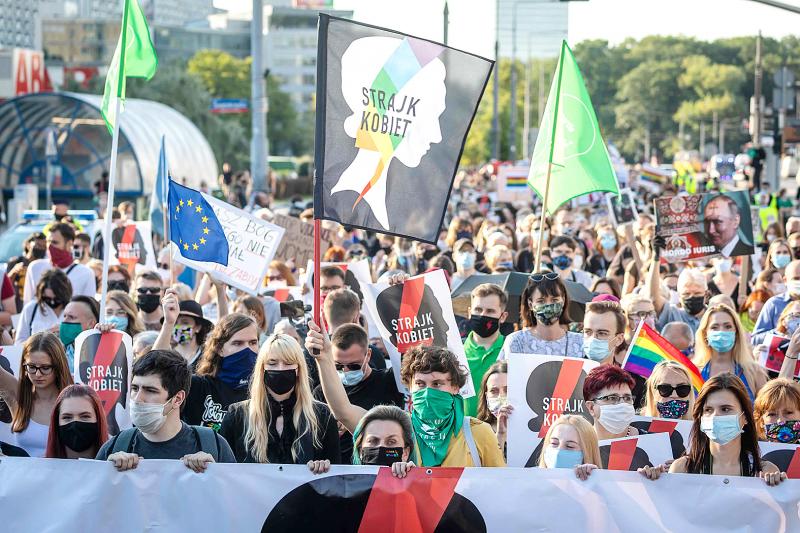The EU and the Council of Europe on Sunday voiced regret and alarm over the Polish right-wing government’s move to withdraw from a landmark international treaty combating violence against women.
The Council of Europe said it was “alarmed” that the Polish government was moving to withdraw from a landmark international treaty combating violence against women.
Polish Minister of Justice Zbigniew Ziobro over the weekend said that he would yesterday begin preparing the formal process to withdraw from the Istanbul Convention.

Photo: AFP
The treaty is the world’s first binding instrument to prevent and combat violence against women, from marital rape to female genital mutilation.
Ziobro has in the past dismissed it as “an invention, a feminist creation aimed at justifying gay ideology.”
The European Commission, the EU’s executive arm, told reporters in Brussels that it “regrets that such an important matter has been distorted by misleading arguments in some member states.”
The Commission added that it would “continue its efforts to finalize the EU’s accession” of the convention, which was signed in 2017, but has not yet been ratified.
A previous centrist Polish government signed the treaty in 2012 and it was ratified in 2015.
The treaty was spearheaded by the Council of Europe, the continent’s oldest human rights organization, and its Secretary-General Marija Pejcinovic Buric condemned the Law and Justice (PiS) government’s plan to withdraw.
“Leaving the Istanbul Convention would be highly regrettable and a major step backwards in the protection of women against violence in Europe,” she said in a statement on Sunday. “If there are any misconceptions or misunderstandings about the convention, we are ready to clarify them in a constructive dialogue.”
About 2,000 people on Friday marched in the Polish capital, Warsaw, to protest the government’s withdrawal plan, some shouting “Stop violence against women.”
There was also outrage from several members of the European Parliament, with Iratxe Garcia Perez, the Spanish leader of the Socialist group, calling the decision “disgraceful.”
“I stand with Polish citizens taking [to] the streets to demand respect for women’s rights,” he tweeted.
The leader of the EU parliament’s Renew Europe group, former Romanian prime minister Dacian Ciolos tweeted: “Using the fight against the Istanbul Convention as an instrument to display its conservatism is a new pitiful and pathetic move by some within the PiS government.”
Irish center-right Member of the European Parliament Frances Fitzgerald said it was now essential for the whole of the EU to ratify the convention “so that no woman is left unprotected and vulnerable to violence.”
The Council of Europe said that the Istanbul Convention’s “sole objective” was to combat violence against women and domestic violence.
Although the treaty does not explicitly mention gay marriage, that has not stopped the backlash to it in Poland, Hungary and Slovakia.
In Slovakia, the parliament rejected the treaty, saying — without proof — that it was at odds with the country’s constitutional definition of marriage as a heterosexual union.
The Strasbourg-based Council of Europe, which is separate from the EU, has no binding powers, but brings together 47 member states to make recommendations on rights and democracy.
Warsaw has already clashed with the EU Commission over reforms to its judicial system, championed by recently re-elected Polish President Andrzej Duda.
Turkey is also mulling a possible withdrawal from the treaty, and on Sunday, women marched in several cities there to express support for the treaty.
The demonstrations also reflect rising anger in Turkey at the growing number of women killed, including the murder of university student Pinar Gultekin this month.

Shamans in Peru on Monday gathered for an annual New Year’s ritual where they made predictions for the year to come, including illness for US President Donald Trump and the downfall of Venezuelan President Nicolas Maduro. “The United States should prepare itself because Donald Trump will fall seriously ill,” Juan de Dios Garcia proclaimed as he gathered with other shamans on a beach in southern Lima, dressed in traditional Andean ponchos and headdresses, and sprinkling flowers on the sand. The shamans carried large posters of world leaders, over which they crossed swords and burned incense, some of which they stomped on. In this

Near the entrance to the Panama Canal, a monument to China’s contributions to the interoceanic waterway was torn down on Saturday night by order of local authorities. The move comes as US President Donald Trump has made threats in the past few months to retake control of the canal, claiming Beijing has too much influence in its operations. In a surprising move that has been criticized by leaders in Panama and China, the mayor’s office of the locality of Arraijan ordered the demolition of the monument built in 2004 to symbolize friendship between the countries. The mayor’s office said in

‘TRUMP’S LONG GAME’: Minnesota Governor Tim Walz said that while fraud was a serious issue, the US president was politicizing it to defund programs for Minnesotans US President Donald Trump’s administration on Tuesday said it was auditing immigration cases involving US citizens of Somalian origin to detect fraud that could lead to denaturalization, or revocation of citizenship, while also announcing a freeze of childcare funds to Minnesota and demanding an audit of some daycare centers. “Under US law, if an individual procures citizenship on a fraudulent basis, that is grounds for denaturalization,” US Department of Homeland Security Assistant Secretary Tricia McLaughlin said in a statement. Denaturalization cases are rare and can take years. About 11 cases were pursued per year between 1990 and 2017, the Immigrant Legal Resource

‘RADICALLY DIFFERENT’: The Kremlin said no accord would be reached if the new deal with Kyiv’s input did not remain within the limits fixed by the US and Russia in August Ukrainian President Volodymyr Zelenskiy is to meet US President Donald Trump in Florida this weekend, but Russia on Friday accused him and his EU backers of seeking to “torpedo” a US-brokered plan to stop the fighting. Today’s meeting to discuss new peace proposals comes amidst Trump’s intensified efforts to broker an agreement on Europe’s worst conflict since World War II. The latest plan is a 20-point proposal that would freeze the war on its current front line, but open the door for Ukraine to pull back troops from the east, where demilitarized buffer zones could be created, according to details revealed by